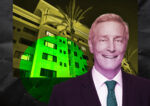As WeWork exits bankruptcy to start a new life, its investment arm is in dire straits at one of its Austin properties.
801 Barton Springs Road has been transferred to special servicing, according to Morningstar Credit. The 90,000-square-foot office just south of Lady Bird Lake lies in one of the most valuable commercial areas outside of the central business district, accessible both to downtown and the suburbs to the southwest.
The property was sent to special servicing after WeWork Capital Advisors, WeWork’s investment arm, failed to make the final balloon payment when the loan matured in May. The $34.5 million loan, which WeCap, as the group is called, used to acquire the building in 2019, was originated that April.
WeCap operates under separate corporate managers from WeWork, and it is an independently registered fund working on behalf of its own investors, a WeWork spokesperson said. However, WeWork holds a majority stake in the operation, which had $886 million in assets under management as of March, according to Bisnow.
A partnership of Joe Llamas’ Generational Commercial Properties and Houston-based HTZ Investments bought the land in 2015. Several developers had tried and failed to develop the property, but nothing worked because of the site’s zoning and unique configuration, according to a blog post by the commercial brokerage Aquila. Generational finally got something built, putting up its contemporary, blocky office building in 2018.
WeWork leased the entire building that year and bought it in 2019. The coworking company signed a 20-year lease, receiving the first eight months of rent free and $75 per square foot for tenant improvements. There were no termination options in the lease, and WeWork agreed to a corporate guarantee of $18.4 million.
Rent worked out to $39.54 per square foot, with 2 percent annual increases.
WeWork is still working out whether it will stay in the building, the spokesperson said.
Read more



Now, WeCap will be sitting across the table from Rialto Capital Advisors, one of the largest — and most ruthless — special servicers in the country.
Austin’s office market reached a record vacancy rate last quarter, with 25.2 percent of space sitting empty. Shortly after companies began calling workers back into offices, Austin appeared to have one of the strongest return rates in the country. But a downturn in technology, which has historically accounted for some of Austin’s most significant leases, has sapped enthusiasm. There are still several large projects underway that began work before the downturn, most of them without tenants lined up.
